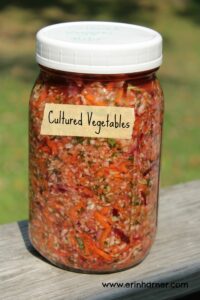Revised and updated. Originally posted March 5, 2016.
You may have seen the buzz about fermented foods. . . beverages like kombucha, kvass, and lacto-fermented vegetables like raw sauerkraut, kimchi, and pickles are going beyond health food stores and hitting traditional grocery store shelves.
People around the globe have been fermenting foods for thousands of years. In fact, it was one of the earliest methods of food preservation. Many of the fermented foods are made from dairy products or vegetables like yogurt, kefir, cheese, saurkraut, kimchi, and pickles, but there are many others like tempeh, miso, soy sauce, kombucha, kvass, sake, wine, vinegar, beer, hard cider, mead, sourdough bread, and others.
preservation. Many of the fermented foods are made from dairy products or vegetables like yogurt, kefir, cheese, saurkraut, kimchi, and pickles, but there are many others like tempeh, miso, soy sauce, kombucha, kvass, sake, wine, vinegar, beer, hard cider, mead, sourdough bread, and others.
3 reasons to eat fermented foods
- There are over 100 trillion microbes in and on the human body, the majority residing in the colon. The human microbiome consists of all of the genetic material of all of the microbes and weighs about 5 pounds. Over time, people eating a Western-style diet have lost diversity of the microbiome and this poses many health risks since the bacteria in the microbiome help digest the food we eat, regulate the immune system, and produce vitamins like B12, thiamine, riboflavin, and K2. Not to mention, a healthy microbiome protects against other pathogenic bacteria that cause disease. Incorporating fermented foods into your diet can positively change the gut microbiome relatively quickly.
- Probiotics versus fermented foods: Taking probiotic supplements that typically contain one or several strains of bacteria and/or yeasts can be very helpful for targeting specific strain populations in the gut like L. acidophilus or S. thermophiles that can contribute to improved health. Eating a variety of fermented foods that contain much more diversity of species of probiotic bacteria and yeasts than probiotic supplements can help improve the diversity of the gut microbiome immensely when eaten over time.
- Nutritional content of food actually increases when you ferment it thanks to the lactic acid bacteria. Unlike canning as a method of food preservation, fermenting foods preserves the enzymes in the foods which naturally helps the body break the food down. During the fermentation process, lactic acid bacteria make vitamins and increase the bioavailability of many minerals making the foods and beverages even more nutritious than before they were fermented.
Where to find fermented foods
- Look for them where you usually shop. You may find a number of under-cover fermented foods like yogurt, kefir, miso, tempeh, and raw sauerkraut. You will almost always find fermented foods in a refrigerator case.
- Health food stores often have a wide variety of fermented foods including kimchi, kombucha, kvass, lactofermented pickles, interesting blends of veggies, and loads of others depending on what’s made locally or regionally.
- Make them yourself. This is definitely the least expensive option but does take some patience! Many fermented foods don’t require a starter but some do. If you’re looking for starter cultures and things like SCOBYs for starting kombucha, check out Cultures for Health.
How much and how often should you eat fermented foods?
- Ideally, eat a variety of fermented foods everyday
- A helpful rule of thumb to think about with fermented foods is to eat about 1 tablespoon at each main meal- think condiment size servings of fermented vegetables or shot glasses of kombucha or kefir
Fermented Foods Books and Recipes
If you’re DIY-inclined, there are literally 1000’s of recipes to make fermented foods yourself online and in books. If you’re looking for recipes and reading material on fermented foods, two of my favorite fermented foods books are:
- The Art of Fermentation by Sandor Katz
- Real Food Fermentation by Alex Lewin
For recipes to make fermented foods yourself at home, check out these to get you started:
If you’re looking for some more scientific information on fermentation and fermented foods, check these articles out:
- “Everything you always wanted to know about fermented foods” by Lucy Shewell, PhD, posted on Science-Based Medicine (https://www.sciencebasedmedicine.org/everything-you-always-wanted-to-know-about-fermented-foods/)
- Parvez, S., Malik, K. A., Ah Kang, S., & Kim, H. Y. (2006). Probiotics and their fermented food products are beneficial for health. Journal of applied microbiology, 100(6), 1171-1185. (http://onlinelibrary.wiley.com/doi/10.1111/j.1365-2672.2006.02963.x/full)
- Dufresne, C., & Farnworth, E. (2000). Tea, Kombucha, and health: a review. Food research international, 33(6), 409-421. (http://partnoosh.com/img/Tea%20Kombucha%20and%20health.pdf)
What’s your favorite fermented food? Leave a COMMENT below!


Pingback: Super Simple Sauerkraut
Fermented dill pickles and Fermented beets.
Perfect timing, yesterday I started my first homemade batch of fermented beets. Fingers crossed it is successful ♥️
Yes! Let me know how the fermented beets go. . . they are a tricky ferment to start with. Due to their high sugar content, yeast want to prevail over bacteria. My trick to get beets to ferment properly is to use a little bit of fermented sauerkraut or pickle juice as a starter to nudge it in the right direction. -Erin